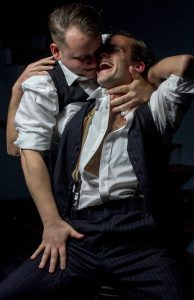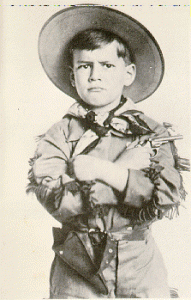Look Elsewhere for the Climax in Diversionary’s Very Poor ‘Thrill Me’
On May 21, 1924, Nathan Leopold Jr. and Richard Loeb entered their names onto the roster of killers that even today fuels Chicago’s national reputation as a murder capital. They kidnapped, stabbed and strangled 14-year-old Bobby Franks for kicks, bludgeoning him with a small tool and pouring acid over the corpse in an attempt to prevent its identification.
They dumped Franks’ naked body in a culvert near the Indiana state line after stopping for dinner, convinced that their seven months’ preparation for the crime had yielded the perfect murder.

In their own minds, Nathan Leopold (Michael Parrott, left) and Richard Loeb (Scott Nickley) are neither human nor accountable. Photo by Daren Scott.
Leopold would claim that his off-the-charts intelligence was defense enough – in a letter written prior to the killing, he’d told Loeb that “A superman… is, on account of certain superior qualities inherent in him, exempted from the ordinary laws which govern men. He is not liable for anything he may do.” He was also no slouch at manipulating his circumstances, at least not according to playwright Stephen Dolginoff. In Dolginoff’s musical Thrill Me, the current entry at Diversionary Theatre, he’s a step ahead of Loeb all the time, gathering the evidence that would lead to Loeb’s incarceration and, presumably, the pair’s inseparability at Joliet Prison for the rest of their days.
That’s an interesting twist and stuff, setting Thrill Me apart from the material in the many plays, movies and books about the case. Where the play stops being interesting is at the beginning – in the first place, there isn’t a thing in it that we can’t find out about these guys (which is to say that Dolginoff has done nowhere near due diligence), and secondly, the principals’ relatively untrained singing voices accompany a choreography that suffers from lack of stage personnel.
The Leopold and Loeb case is a fascinating entry in America’s overflowing crime annals – but only if it’s colored with the sea of anecdotal material it offers up. With Thrill Me, all that’s left is a skeleton.
History usually holds the pair out as gay lovers, and many reports say Franks was raped in the commission of his murder. History also reveals that Leopold was an accomplished bird-watcher who thought the Kirtland’s Warbler was the bee’s knees and that he claimed to speak 25 languages. Both men were described as brilliant, having cultivated their relationship as law students at the University of Chicago, where they’d met in earnest as teenagers (at 17, Loeb was, and is, the youngest undergraduate to complete degree studies at the University of Michigan).
Money and power pepper the picture, too. Loeb’s lawyer father Albert was eventually a Sears vice president; Nathan Sr., Leopold’s dad, built his fortune in shipping and aluminum cans; and pawnbroker Jacob Franks later struck it rich in the watch business.
On and on the anecdotes roll – but you’ll never hear about them in this show. Any more than you’ll learn Leopold died a free man as recently as 1971 or the reasons behind Loeb’s murder at Joliet in 1936. Or that the Franks house is still standing in Chicago’s wealthy Kenwood area. Or the fact that Leopold’s middle name is Freudenthal. These are the facts and factoids that compose flesh-and-blood characters, and they require fleshing out before those characters are believable. Dolginoff’s thoroughly fleeting references to the pair’s law studies, defense lawyer Clarence Darrow (who supposedly saved them from the chair) or the killers’ ages (Nathan was 19, Richard 18, and Dolginoff never comes close to even stating them) hardly stand up by comparison.

Even as a kid, Richard Loeb was judge, jury and executioner. Public domain photo.
Scott Nickley’s chiseled features are a world away from Michael Parrott’s bug-eyes and pudding face, and that’s what makes this duo so physically interesting as Loeb and Leopold respectively – the unlikeliness of their relationship comports well against the bizarre nature of the crime. And there’s no doubt as to the alpha male here; Loeb treats Leopold like the fly he is (which, it turns out, is exactly what Leopold and the playwright want).
Tony Houck’s tango-heavy musical direction works fairly well amid the couple’s basically adversarial relationship, while Erick Sundquist’s funereal costumes state the obvious. Bret Young’s minimalist set captures the play’s dankness, but Michael Mizerany’s choreography is hobbled on it, as it’s tough to block for subtext with only two actors. Conor Mulligan’s lights work in the same way that Houck’s music efforts succeed.
The play contains several references to 1958, the year Leopold was paroled. That’s a start in unearthing the elements that make these guys the psychos they were, but it doesn’t go nearly far enough, leaving director Young pretty much stranded throughout. You can’t have a bioplay without bios, even feeble attempts at bios – accordingly, the only thrill in Thrill Me is downstairs, in Diversionary’s bar.
This review is based on the matinée performance of May 11. Thrill Me runs through May 25 at Diversionary Theatre, 4545 Park Blvd. in University Heights. $25-$39. 619-220-0097, diversionary.org.

Martin Jones Westlin, principal at editorial consultancy Words Are Not Enough and La Jolla Village News editor emeritus, has been a theater critic and editor/writer for 25 of his 47 years…
More…


